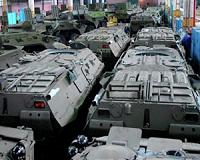| . |  |
. |
Elyakim Training Base, Israel (AFP) July 9, 2010 Four years after its devastating war in south Lebanon, Israel says it hopes peace will hold but keeps its troops at the ready, claiming Hezbollah is stockpiling weapons in villages. At the Elyakim army base in northern Israel, a "village" of concrete structures, done up to look like simple one- and two-storey homes, is riddled with paint ball markings. Burnt out trucks, a wrecked tank and earth-shaking blasts add a touch of realism. Smoke rises to the cloudless sky. Half a dozen soldiers crouch low as they silently scramble up a nearby hill, a few metres at a time, using the foliage as cover. Suddenly they start firing their automatic weapons at targets hidden in the trees. An acrid smell fills the air, spent cartridges litter the ground. It is here that troops are putting into practice what they learned during the 34-day war that started on July 12, 2006 when Israel retaliated for a cross-border raid in which Hezbollah militia captured two Israeli soldiers and killed three. The war with Hezbollah destroyed much of Lebanon's major infrastructure and killed more than 1,200 people Lebanese, mainly civilians, and 160 Israelis, mostly soldiers. The Elkayim course, mainly for infantry units, lasts about a week, and involves the use of paintball guns, blanks and live fire. A large rock on a hillside suddenly takes on a life of its own and becomes a heavily armed soldier, who quickly discards the grey tarp that covered him. Camouflage netting covers Katyusha launchers and stocks of weapons, and a cable snakes through the foliage meaning a booby trap has been set. A fake rock hides an explosive device, and a crevice in the ground is a firing position, A couple of soldiers look up from an underground bunker which officers say is a perfect replica of Hezbollah tunnels in southern Lebanon. "The intent is to make the forces better prepared to fight guerrilla organisations without harming civilians," explains Captain Arye Shalicar, a military spokesman. This week, Israel published a series of photographs showing what it said was evidence proving Hezbollah had changed tactics since 2006 -- shifting some three-quarters of its estimated 40,000 rockets into villages in south Lebanon rather than storing them in open areas. "They have warehouses of rockets near mosques, schools, medical centres, in the middle of villages, and they look like any other building," military spokeswoman Lieutenant Colonel Avital Leibovitz told AFP. During the war, much of the fighting took place on open scrubland, but since then the militia has gravitated towards built-up areas -- in a bid to exploit Israel's "sensitivity towards civilians," she claimed. "They know we put a lot of effort to avoid hurting civilians. That is why they put their weapons in the middle of civilian areas to make it difficult for us to act against them," she said. Down at the base, another officer, who asked not to be named, said getting troops to distinguish between civilians and "terrorists" was a key part of the training. "Hezbollah know they can't win, but they want to delegitimise Israel. The more civilians are killed, the more Israel will be criticised -- the same as with the flotilla." Israeli commandos killed nine Turkish activists on May 31 when they stormed an aid flotilla that sought to bust the Gaza embargo. The incident stirred a storm of international protests. Israel claims the troops were forced to fire after being brutally attacked as they boarded the Turkish Mavi Marmara ferry. Video clips show soldiers being beaten with poles. Both sides regularly accuse each other of escalating tension and violating UN resolution 1701 which ended the war, with Israel conducting military overflights of southern Lebanon and Hezbollah stockpiling weapons. But despite sporadic flare-ups, with rockets fired at Israel which responds with air strikes, the Israeli-Lebanese border has generally been calm since the end of the war. "Right now it's calm and we hope it will remain so," said Shalicar. "But in case they do again feel like provoking us, killing or kidnapping soldiers as happened four years ago, we have to be ready to fight the guerrillas, and be ready for the different terrains they use."
Share This Article With Planet Earth
Related Links
 Russia sending APCs to West Bank
Russia sending APCs to West BankMoscow (UPI) Jul 7, 2010 Russia announced plans to send 50 armored personnel carriers to the Palestinians, a move that has been blocked in the past by Israel. Russian Foreign Ministry spokesman Andrei Nesterenko said the vehicles would be used for internal security purposes in the West Bank and that the delivery was imminent, the Itar-Tass news agency reported. "In the coming days 50 armored personnel ca ... read more |
|
| The content herein, unless otherwise known to be public domain, are Copyright 1995-2010 - SpaceDaily. AFP and UPI Wire Stories are copyright Agence France-Presse and United Press International. ESA Portal Reports are copyright European Space Agency. All NASA sourced material is public domain. Additional copyrights may apply in whole or part to other bona fide parties. Advertising does not imply endorsement,agreement or approval of any opinions, statements or information provided by SpaceDaily on any Web page published or hosted by SpaceDaily. Privacy Statement |